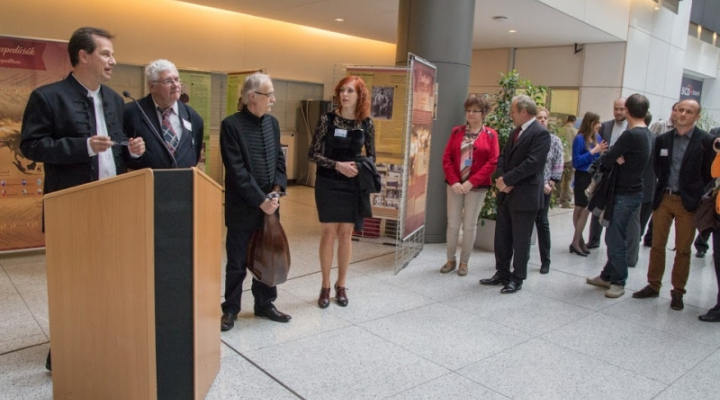Famous Hungarian travellers and explorers remembered in Brussels
At the initiative of MEP Csaba Sógor, Dr. János Kubassek and Zoltán Bujna held on 1 April a presentation entitled ”Eastern Moments” that was accompanied by projections at the Balassi Institute from Brussels. The happening preceded the festive inauguration on 2 April by the Hungarian MEP from Transylvania of the exhibition entitled ”Points of contact – Hungarian travellers and explorers”.
Kossuth prize winner musician Tamás Kobzos Kiss was also invited to play at the event.
Following the welcome words of Csaba Sógor, based on his book The Hungarian Hermit of the Himalayas – The Journey of Sándor Csoma de Kőrös from Transylvania to India geographer and museum director Dr. János Kubassek held a presentation on the work of the great explorer of the Hungarians’ ancestral homeland and the creator of the first Tibetan-English dictionary. The lecturer described Csoma’s student years from Chiuruș and Aiud and later from the University of Göttingen, as well as Csoma’s travel through Asia. The lecturer also visited the ancient monasteries from the Northern Himalayas, Zangla, Phouktal and Kanam, where Csoma laid the bases of a new science, Tibetology.
The Móra Ferenc prize holder lecturer also presented the activity of the scientists who were in touch with Csoma – also known as “the saint of the Szeklers” - his main achievements and his activity in the Asiatic Society of Bengal.
Slovakian writer and cyclist Zoltán Bujna, in the summer of 2013 followed the trail of Ármin Vámbéry by bicycle. He visited inner Asia’s most mysterious cities in 107 days and rode through the continent’s hottest deserts. After 7 400 kilometres, he finished his journey in the Pamir Mountains. Through his photo projection he led the public from Brussels through many interesting Central Asian countries.
At the opening of the exhibition “Points of contact – Hungarian travellers and explorers” Csaba Sógor mentioned how these illustrious Hungarian travellers contributed to a great extent to the expansion of scientific knowledge in fields such as natural history, geography, geology, botany, zoology, ethnography or even linguistics. Sógor emphasized that although these people were of various religions and qualifications, still they were bound by the same calling and desire for exploration, and continued by stressing the importance of manifesting the same openness and tolerance towards other cultures. ”Although in another era and in other circumstances, we should nevertheless show the same openness towards each other and towards other cultures and peoples with whom we get in contact during our everyday lives or travels”, concluded Sógor.











